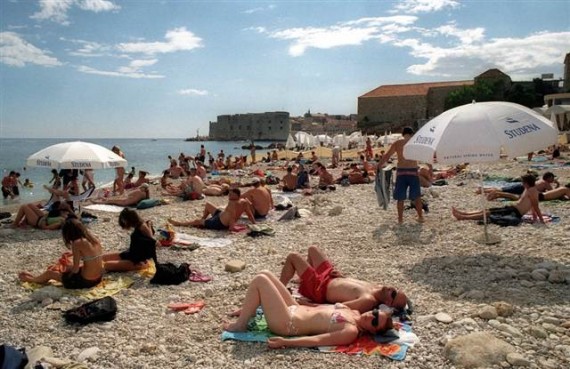A Lot Of Europeans Are About To Get Sick While On Vacation
European nations are already famous for mandating exceedingly long summer vacations for private and public workers, a concept that in an of itself is unfamiliar to most Americans. Several years ago when I was dealing with a case that involved a company in Italy, I was told in June that I needed to have my witnesses for a trial in September lined up by mid-July because the entire nation would essentially be going on vacation for a month and a half and there’d be nobody to talk to. Needless to say, this made my job rather difficult, although I’m sure the employees in question enjoyed their extended vacation immensely. Now, a European Court has come down with a decision that seems guaranteed to make those mandatory vacations even longer:
BRUSSELS — For most Europeans, almost nothing is more prized than their four to six weeks of guaranteed annual vacation leave. But it was not clear just how sacrosanct that time off was until Thursday, when Europe’s highest court ruled that workers who happened to get sick on vacation were legally entitled to take another vacation.
“The purpose of entitlement to paid annual leave is to enable the worker to rest and enjoy a period of relaxation and leisure,” the Court of Justice of the European Union, based in Luxembourg, ruled in a case involving department store workers in Spain. ”The purpose of entitlement to sick leave is different, since it enables a worker to recover from an illness that has caused him to be unfit for work.”
With much of Europe mired in recession, governments struggling to reduce budget deficits and officials trying to combat high unemployment, the ruling is a reminder of just how hard it is to shake up long-established and legally protected labor practices that make it hard to put more people to work and revive sinking economies.
The workers originally won their case in a Spanish court, where they argued that collective bargaining agreements made a distinction between annual leave and sick leave that was recognized by Spanish law. The National Association of Large Distribution Businesses, known as Anged, appealed to the Supreme Court in Madrid, which then asked the Court of Justice for a ruling on how to apply European law covering working times.
The Court of Justice had previously ruled that a person who gets sick before going on vacation is entitled to reschedule the vacation, and on Thursday it said that right extended into the vacation itself.
“The point at which the temporary incapacity arose is irrelevant,” the court found.
The ruling applies across the European Union of 27 countries.
The incentive that this kind of ruling creates should be rather obvious. I think European employers should expect many of their employers to suddenly develop some illness or another over the upcoming summer vacation period, and plenty of doctors willing to verify their “illness.” Of course, this ruling doesn’t apply to those that are unemployed, they’re on a permanent vacation these days.
H/T: Marginal Revolution
Photo via MSNBC






I wonder what happens when you get sick while you’re already sick? Or if you’re sick during the night or on the weekend? A lot of fascinating questions for European courts.
So having people take less vacation is supposed to help with unemployment? It seems to me that a company has less need of workers when those it employes spend more time in the office and less at the beach. Additionally, I reckon that people spend more while on vacation than they do at other times of the year, thereby boosting the economy.
Generally speaking, I think European countries err on the side of job security, making it overly expensive to fire people. Companies are more hesitant to hire when choosing the wrong person can make for a costly mistake. Companies also need to think hard about meeting extra demand with beefed up staff should that demand later disappear. Tweaking the laws to allow companies to be more dynamic while ensuring that the safety net is there to catch the unlucky would do more to boost the economy instead of foolishly focusing on vacation time, in my opinion.
Since Europe has been mandating these vacations for a good long while, surely there’s some statistical evidence to indicate what if any drag they are on the Continental economy.
Mike
Thank God we North ‘Muricans are too enlightened for that garbage. We get two weeks paid vacation (if our benevolent employers feel like giving it to us), and we’re happier and healthier than those Socialists over in Yurp…..aren’t we?
I don’t quite follow your logic Doug.
I imagine that workers in Europe have a set number of possible sick days, to go along with a set number of vacation days. The ruling merely keeps these separate. If workers start faking illnesses on their vacation, they would simply be using up sick days that they would not then be able to use at other times.
If you are convinced that the workers will fake sicknesses, then why don’t you assume they are doing so now? I wonder what the statistics are regarding how many sick days go unused in a given year.
But I don’t see how reclassifying one of your vacation days as a sick day really changes anything – you are using up one type of day off or the other…
I worked for a couple of Japanese companies and Japan basically shuts down for six weeks in the summer. In addition they have twice as many holidays as we do.
Snarky comment, or a deeply held belief that unemployment insurance creates lazy slackers sitting on the beach not looking for work? I’m just going to pretend it was the former.
There’s nothing to this ruling. It’s not unusual to be allowed to replace your vacation days with sick days. It’s interesting that they are allowed to reschedule their mandated vacation time when they do that. In my CBA, the only thing mandated is that I be given an opportunity to take at least a 2 week vacation. If I don’t used those days for vacation time, then that’s on me, I don’t get to reschedule.
The article and Doug’s reaction is a bit hyperbolic. The reality is, if you were already abusing your leave, then this really changes nothing. You’ve probably already planned a vacation with your vacation days, and a vacation where you use sick days. And maybe a vacation where you use compensatory time because you clock in 15 minutes early everyday.
First they’ll have to find a doctor that’ll sign a paper saying they’re sick.
@Kit:
This is true, and a conscious decision on their part. European societies have much more extensive social safety nets and public services (and correspondingly higher taxes) than the US – part of the pro/con of that is that you can’t tax people who have no income. Making it harder to fire people is one way of husbanding that tax base.
Can’t comment… too busy working…
The European economy seems to be doing just fine, so they should allow more time off.
I think Europe is more civilized than the United States in any number of ways. This court ruling just underscores that.
there’s probably a happy medium to be found inbetween this kind of ruling (“work unimportant, slack off all you want!”) and the status quo in the US (“work until you drop dead, you lazy bitches!”).
Once upon a time on a planet far away I had two blocks of hours that I accumulated each work-period. One was called “vacation”. The other was called “sick time”. That planet was called the United States of America. Today I have a thing called “Paid Time Off”. So I have to schedule my sicknesses for the convenience of my employer and if I’m sick, not take vacation. I don’t know exactly what to call this new planet.
We’re the ‘reverse Europe.’
I know far too many people in management positions who have accrued a lot of vacation leave and do not take much more vacation leave than one week a year because they are afraid that they might lose their jobs if they are away from the office.
I recall when magazines like Popular Science and Popular Mechanics touted technological advances as being a gateway for people to have more leisure time (or time to spend time with the kids and get things done around house). Now leisure time seems to be a negative concept, something for slackers.
@Bob:
I admire the young people who have the wherewithall and means to be slackers.